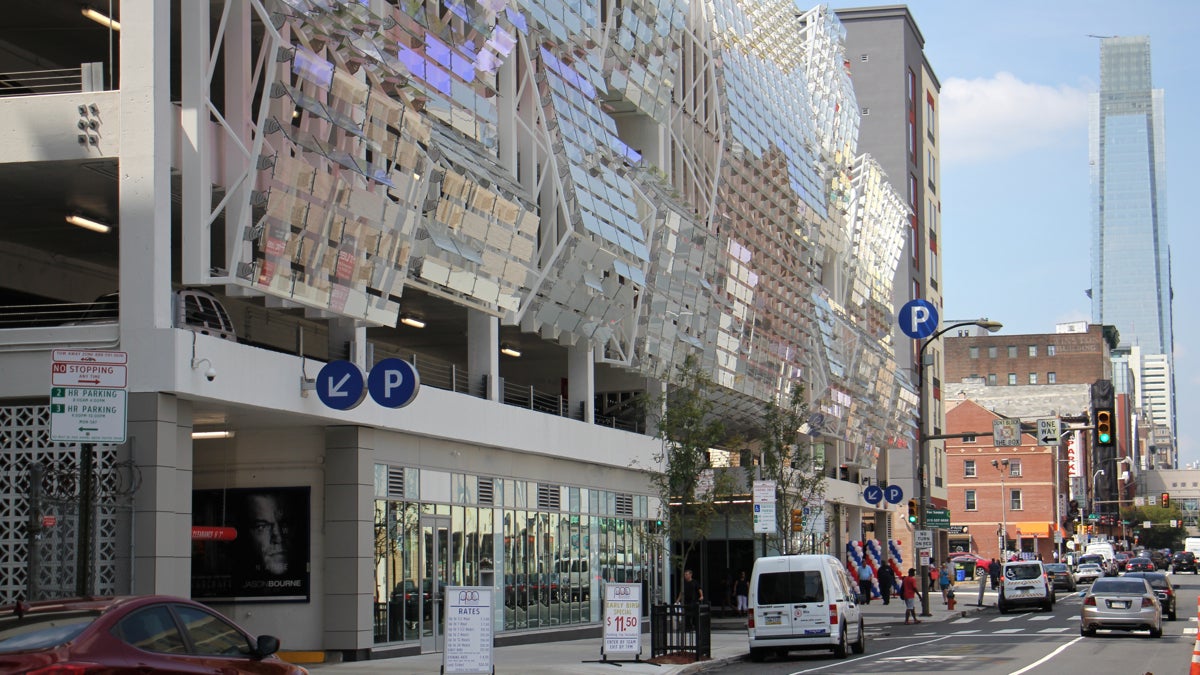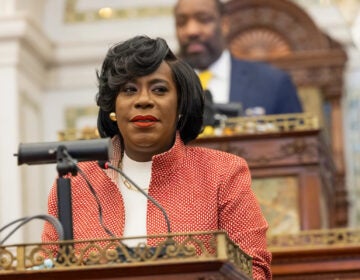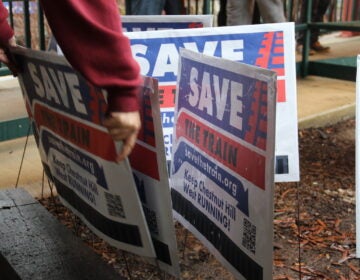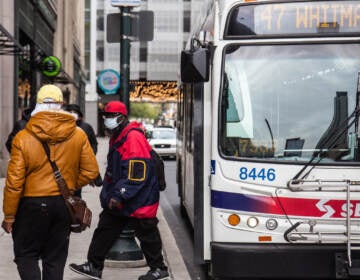Parking Authority chief Petri offers up a sweeping legislative agenda for change
For most of the Parking Authority’s history, its legislative agenda was little more than maintaining the status quo.
Listen 3:06
The former Gallery Mall parking garage has been transformed into the Parkade at 8th. (Emma Lee/WHYY)
Sitting at a conference table, sporting a tie emblazoned with lines from the U.S. Constitution and a likeness of Independence Hall, Scott Petri began an interview with a warning for the reporter.
“I sometimes get accused of giving too much information and that I’m, quote, ‘overwhelming’ people,” the executive director of the Philadelphia Parking Authority said before launching into his plans to pass a suite of bills in Harrisburg and City Hall to save Philadelphia money, improve the School District’s revenue streams, make ride-hailing safer, free up parking, and unclog the traffic jamming up Center City and University City.
And, along the way, make the PPA a larger, more powerful agency with a bigger budget, too.
“So, it can sound a little self-serving,” Petri said at one point during the hour-and-a-half jaw session about his legislative agenda. But the introspection didn’t last long, even as he acknowledged the scope of his ambition.
“Yeah, some of these things will be tough,” Petri said. “When I presented the package, some people’s reaction — some elected officials [said], ‘Boy, that’s a big agenda!’ But it all fits together, it’s all logical; some of them are human quality-of-life issues, and those always rise to the top.”
The details of the PPA’s legislative proposals have yet to be set — no bills have been introduced. Some would need approval from City Hall, others from Harrisburg. Some are purely local, others could change traffic enforcement across the commonwealth if enacted. The one thing they have in common: brazenness. No state and local bureaucracy in recent history has so publically pursued a legislative agenda.
“This would be a new approach,” said former Gov. Ed Rendell.
For most of the Parking Authority’s history, its legislative agenda was little more than maintaining the status quo. (After nearly a decade of lobbying by the handicapped community, the PPA moved to increase the number of wheelchair-accessible taxis in 2015, just as ride-hailing started operations in Philadelphia, decimating the market for new cab medallions.)
“Other than revenue stuff, I haven’t seen much effort to do much in Harrisburg,” said Rendell.
Now, under Petri, the PPA seems poised to take the lead in trying to address some of the city’s most pressing transportation problems. It’s a mighty large change for a mostly loathed organization, one that suffers from a deficit of trust after years of alleged financial mismanagement, bureaucratic bloat, sexual-harassment scandals, and aggressive ticketing.
Or, as Rendell put it, “It’s not like [Petri’s] coming from the Pew Trusts to study traffic, y’know what I mean? He’s coming from an agency where his credibility is somewhat in doubt.”
Regulating ride-hailing
Petri wants Harrisburg to authorize a 50-cent surcharge on all taxi, limo and ride-hailing trips in Philadelphia and use that money to increase the PPA’s enforcement of transportation network companies like Uber and Lyft. As part of the move, taxis would no longer have to charge an assessment fee, helping to even the imbalance of fees between cabs and the TNCs.
Compared to taxis and limos, TNCs are barely regulated. Whereas all taxis and limos undergo rigorous periodic safety inspections, Petri said that the current statutes only allow the PPA to inspect a tiny sample size of 35 vehicles per company. Those vehicles must pass the same annual Department of Motor Vehicles inspections as all cars in Pennsylvania, suggesting that additional inspections by the PPA would be redundant. But Petri said his inspectors discovered serious defects in some transportation network companies’ cars — such as a broken catalytic converter spewing potentially deadly carbon monoxide into the passenger compartment — that the state inspectors missed.
The PPA’s budget for enforcing regulations against TNCs is currently just shy of $4 million, Petri said. He wants to increase it to $8.2 million.
“What it would enable us to do is rehire boots on the ground,” said Petri. “The legislature has decided what it’s decided — we can’t do certain things, so how are we going to protect the public? We’re just going to put more people out on the street, looking for obvious violations, looking for consumers.”
The additional enforcement officers would try to ticket drivers for Uber, Lyft and similar companies for violations such as stopping mid-block to pick up or drop off passengers, failing to have a company decal on the car, or clear safety issues with a car, like a broken light.
According to a presentation prepared by the PPA for the State House Urban Affairs Committee, TNCs now control 83 percent of the livery service market; cabs have been reduced to 15 percent, and limos just 2 percent.
Increased fees on ride-hailing trips also would mean additional revenue for the School District of Philadelphia, which gets two-thirds of all fees assessed against the TNCs. The PPA estimates that the schools would get $11 million a year under the surcharge proposal, up from $3 million today.
Funding fights
In recent years, the Parking Authority has been beaten up by education-funding advocates upset that the agency hasn’t sent the School District as much money as state legislators promised when they took control in 2001. State law requires the PPA to split its revenue from on-street parking (meters and tickets, basically) between the city treasury and the School District, with city getting the first $35 million (plus an “accelerator” determined by a complex formula) and the schools receiving the remainder.
Like his predecessors, Petri has maintained that how much money the schools get is largely out of his control. Education advocates retort that the agency, long known to be a patronage den, could streamline its operations, thereby reducing expenses and sending more cash to the kids.
According to Petri, the PPA doesn’t have a dog in this fight — it will send the revenue on to whomever state law directs. But he said that he’s open to the idea of essentially flipping the current formula — that is, giving the schools the first $35 million, or perhaps more, of on-street parking profits.
Making the builders pay
Petri wants City Council to increase the cost of contractor parking permits. The permits currently cost $150 for six months. Petri proposes raising the fee to $600. He argued that cheap permits allow builders to park their vans and trucks in any metered on-street spots all day, for next to nothing.
“To me, this is bad public policy, that’s the bottom line,” Petri said. “It’s just bad public policy. It impacts revenue, but worse yet, it impacts business and people that are trying to get to the hospital, the doctor — necessary public services — so that some contractor who’s going to make money all day can park for less than a buck a day.”
A contractor permit also allows parking in a loading zone for up to four hours — a privilege Petri said many abuse. So he also would like City Council to increase the penalties for parking violations, noting that many contractors simply incorporate their $26 tickets into the cost of doing business. The aim of the changes, Petri said, would be to encourage contractors to park in garages and free up spots for parking and loading zones for deliveries.
Mike Carroll, deputy managing director of the Office of Transportation and Infrastructure Systems (OTIS), sounded a cautiously supportive note.
“We are intrigued by the proposal, and I think it merits a good look, and I have not heard personally the counterargument that makes it seem like it’s not a good idea ” Carroll said. “But I think we have to complete that conversation, and I think the administration would have something more definitive to say.”
According to Petri, raising the fee would also increase on-street parking revenues by $8 million a year — money that would then go to fund the city and schools.
Re-upping at the airport
Perhaps least controversial is PPA’s request to have its charter extended and the lease on Philadelphia International Airport’s garages renewed. The PPA runs the airport’s parking garages on behalf of the city, which owns the airport, paying back all revenue after expenses.
Petri said the PPA’s statutory authorization is set to expire in 14 years. It’s not entirely uncommon for government agencies to have sunset provisions like this, which are designed to force future legislatures to periodically reexamine their operations and whether they still serve a compelling need. Though no one realistically expects the PPA to fade away in 14 years, the uncertainty is enough to make municipal-bond underwriters nervous and refuse to issue the PPA a 30-year bond.
Likewise, the airport’s lease with the PPA is set to expire in a few years, which makes financiers nervous. That lease requires the PPA to maintain the garage structures, and they need some work, Petri said. The authority wants to issue long-term bonds to cover the construction costs of the rehab work. Unless Harrisburg extends the charter and City Council renews the lease, the PPA can’t. Instead, it would be forced to pay for the work out of the garages’ income flows, Petri said, through a shorter-term bond — moves that would cut significantly into the airport’s annual operating budget.
Enabling automated enforcement
Petri’s boldest proposal calls for allowing cities across the state, not just Philadelphia, to enforce traffic laws using automated cameras, radar, and other technology.
The hope is for open-ended enabling legislation to allow municipalities decide which, if any, technologies to deploy. Then local governments — in Philly, City Council — could authorize the police or their parking authorities to use sensor-equipped cameras to snap photos of traffic-law offenders and send them tickets in the mail. Currently, the PPA operates the city’s automated red-light enforcement program. Petri hopes that City Council would authorize the PPA to run a broader automated traffic-violation program throughout Center City and University City, two of the city’s most car-clogged areas.
“It’s probably true both that the number of vehicle miles is down and that, at the high end, on congested days, the travel time is up,” said Carroll.
Petri has floated the idea of using the cameras on SEPTA’s buses — installed to help the transit authority fight frivolous lawsuits — to catch double-parked cars, cars blocking bus lanes, cars parked in bike lanes, and other instances of illegal stopping, which can snarl traffic.
Though Petri and safety advocates portray this proposal as pure common sense — a cost-effective way to bring some semblance of order Philadelphia’s chaotic streets — similar, less-ambitious efforts to authorize automated traffic enforcement have proved to be controversial.
On this, as with other issues on Petri’s statutory agenda, city officials signaled a note of cautious support.
“You can see in the legislative agenda that [the PPA has] put forward that they’re looking at different ways to use technology in order to enforce the rules,” said OTIS’s Carroll. “They’ve got some ideas about ways they can use cameras. We’re also interested in trying to make more use of cameras and other sensor equipment so we can see what’s going on.”
While transportation experts generally back the concept, the idea of using cameras to issue tickets isn’t without controversy, Carroll noted. Efforts to pass similar, but far less sweeping, laws haven’t gone smoothly.
Bills to authorize automated speed enforcement along highway work zones and on Roosevelt Boulevard passed the State House and Senate this year, but the legislature still needs to adopt a version reconciling the differences between the two. Should that happen this fall, before the legislative session ends, Gov. Tom Wolf is expected to sign, and when he does, it will cap a five-year effort to enact the safety measure.
That fight was led, in large part, by Republican State Rep. John Taylor, who represents the 177th District in Northeast Philly and is retiring at the end of the term. Taylor chaired the State House Transportation Committee; State Rep. Bill Keller, who also is retiring, was the minority chair. Petri recognizes that, without the support of senior leadership in Harrisburg, this bill might face an even harder challenge. As a Republican, Taylor was able to broker support for city-backed bills within his party, which has adopted a default position of opposing nearly everything the Philadelphia delegation wants.
That knee-jerk antagonism is personified by GOP State Rep. Daryl Metcalfe, who as chair of the State Government Committee has blocked votes on all Democratic legislation. Petri said he believes all his proposals would avoid Metcalfe’s committee and should go through either the Urban Affairs or Transportation Committees, but he noted that the House majority leader ultimately can assign the bills wherever he wants.
While saying he was supportive of the gist of Petri’s ideas — “Traffic flow is brutal in the city right now” — Rendell added that they appeared to be forging new regulatory territory for the PPA.
“This isn’t the traditional Parking Authority role,” the former Philadelphia mayor and governor said. “Keeping traffic moving is more a city and police function. The Parking Authority is what it says: parking.”
Riding a rough road to passage
Petri seems convinced that the policy arguments for his proposals are too persuasive to be ignored, especially bundled together as they are.
“The reason for packaging some of these congestion-related items together [is that] they raise a substantial amount of money,” he said. “At a time when the city is looking for money to fix potholes, to improve congestion, to fund schools, to have a package of bills that they can say, ‘Hey, we can raise a substantial amount of money and curb bad behavior and improve commerce,’ is a win-win-win. I mean, that’s three wins.”
The PPA’s first step to getting Harrisburg to sign off on the statutory suite is to get the area’s state lawmakers on board.
“Most legislators are probably indifferent to whether something passes or not,” said Petri. “But I would be — and I’m sure they are — very concerned about what the Philadelphia delegation that’s elected to the State House and Senate think on those issues.”
To do that, Petri needs to ensure that the rest of city government is on board. State legislators will look for local unity before they take any steps.
Rendell emphasized the importance of working closely with the mayor’s office and SEPTA if Petri hopes to get his legislative agenda passed.
“He sounds new sounds, like he has some good ideas, but you can’t do those without getting the city on board,” said Rendell. “So, he should be coordinating. It doesn’t seem like he’s coordinating these ideas well.”
Petri has met with SEPTA and OTIS officials, as well as state lawmakers, to discuss the ideas and said he recognizes the importance of getting everyone on the same page.
“The one thing I’m really, really interested in developing is [that] we have one mindset,” he said. “If we’re not with OTIS and the Center City District and University City District and SEPTA and the city Streets Department, we’re not making a good public-policy decision.”
But though those entities usually work on policy issues behind the scenes — quietly lobbying lawmakers and then carefully coordinating any public announcements — Petri’s run a very public campaign for his agenda. He’s touted his ideas to the press, hosted State House committee hearings on them at the PPA headquarters, and even penned an op-ed in the Inquirer and Daily News pushing for the 50-cent trip surcharge.
That’s a radical departure from business as usual, said Rendell.
“What I’ve learned in dealing with politicians over the years, it’s better — if you’ve got an idea for change and it affects them — [to] check with them before it hits the newspapers or the media,” he said.
While OTIS’s Carroll said Petri has made a “strong case” for the proposals, his official response to all of them was decidedly noncommittal. SEPTA has similarly expressed support for the thrust of Petri’s proposals, but has held off on fully endorsing them.
Much of that has to do with the PPA’s continued reputation as an organization that leeches off residents by zealously ticketing parking violations, all to support a bloated payroll for the politically connected. Until that image is rehabilitated, casting one’s lot with the PPA remains politically fraught.
“It’s no surprise to anybody that there’s a need to kind of do something differently. I mean, we didn’t get into this situation where there was a leadership change for no reason,” said Carroll, noting some of the internal reforms Petri has made. “So, this is encouraging.”
Petri said he recognizes the public-relations challenges his agency faces. The first step to fixing the PPA’s bad rep is “changing our philosophy.”
“Our philosophy has got to identify who our customer is; if you don’t know who your customer is, you don’t know how to behave,” said Petri. “So, our customer is certainly not a ticket, and it’s not a vehicle, it’s not a license plate — it’s a person. It’s a human being.”
Changing the culture of a government bureaucracy with nearly 1,000 employees and a history of resisting change may be a bigger challenge than passing a series of bills out of an increasingly partisan and gridlocked state legislature.
Still, Petri said, he has no choice but to try.
“Got to. It’s important that we get these things done,” he said.
“Obviously, if we fail to succeed, then we’ll just continue to [persevere]. I was always in the legislature and I intend to be here, like a dog with a bone. If I get a bone in my mouth, I’m not letting go.”
WHYY is your source for fact-based, in-depth journalism and information. As a nonprofit organization, we rely on financial support from readers like you. Please give today.






